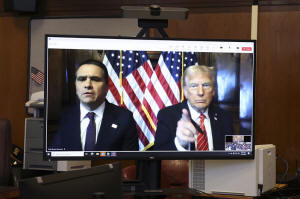Trump gets no-penalty sentence in his hush money case, while calling it
'despicable'
 Send a link to a friend
Send a link to a friend
 [January 11, 2025]
By MICHAEL R. SISAK, JENNIFER PELTZ, JAKE OFFENHARTZ and
MICHELLE L. PRICE [January 11, 2025]
By MICHAEL R. SISAK, JENNIFER PELTZ, JAKE OFFENHARTZ and
MICHELLE L. PRICE
NEW YORK (AP) — President-elect Donald Trump was sentenced Friday to no
punishment in his historic hush money case, a judgment that lets him
return to the White House unencumbered by the threat of a jail term or a
fine.
With Trump appearing by video from his Florida estate, the sentence
quietly capped an extraordinary case rife with moments unthinkable in
the U.S. only a few years ago.
It was the first criminal prosecution and first conviction of a former
U.S. president and major presidential candidate. The New York case
became the only one of Trump's four criminal indictments that has gone
to trial and possibly the only one that ever will. And the sentencing
came 10 days before his inauguration for his second term.
In roughly six minutes of remarks to the court, a calm but insistent
Trump called the case “a weaponization of government” and “an
embarrassment to New York.” He maintained that he did not commit any
crime.
"It’s been a political witch hunt. It was done to damage my reputation
so that I would lose the election, and, obviously, that didn’t work,”
the Republican president-elect said by video, with U.S. flags in the
background.
After the roughly half-hour proceeding, Trump said in a post on his
social media network that the hearing had been a “despicable charade.”
He reiterated that he would appeal his conviction.
Manhattan Judge Juan M. Merchan could have sentenced the 78-year-old to
up to four years in prison. Instead, Merchan chose a sentence that
sidestepped thorny constitutional issues by effectively ending the case
but assured that Trump will become the first president to take office
with a felony conviction on his record.

Trump’s no-penalty sentence, called an unconditional discharge, is rare
for felony convictions. The judge said that he had to respect Trump's
upcoming legal protections as president, while also giving due
consideration to the jury's decision.
“Despite the extraordinary breadth of those protections, one power they
do not provide is the power to erase a jury verdict,” said Merchan, who
had indicated ahead of time that he planned the no-penalty sentence.
As Merchan pronounced the sentence, Trump sat upright, lips pursed,
frowning slightly. He tilted his head to the side as the judge wished
him “godspeed in your second term in office.”
Before the hearing, a handful of Trump supporters and critics gathered
outside. One group held a banner that read, “Trump is guilty.” The other
held one that said, “Stop partisan conspiracy” and “Stop political witch
hunt.”
Manhattan District Attorney Alvin Bragg, whose office brought the
charges, is a Democrat.
The norm-smashing case saw the former and incoming president charged
with 34 felony counts of falsifying business records, put on trial for
almost two months and convicted by a jury on every count. Yet the legal
detour — and sordid details aired in court of a plot to bury affair
allegations — didn’t hurt him with voters, who elected him in November
to a second term.
Beside Trump as he appeared virtually Friday from his Mar-a-Lago
property was defense lawyer Todd Blanche, with partner Emil Bove in the
New York courtroom. Trump has tapped both for high-ranking Justice
Department posts.
Prosecutors said that they supported a no-penalty sentence, but they
chided Trump's attacks on the legal system throughout the case.
“The once and future president of the United States has engaged in a
coordinated campaign to undermine its legitimacy,” prosecutor Joshua
Steinglass said.
[to top of second column]
|

U.S. President-elect Donald Trump appears remotely for a sentencing
hearing in front of New York State Judge Juan Merchan in the
criminal case in which he was convicted in 2024 on charges involving
hush money paid to a porn star, at New York Criminal Court in
Manhattan in New York, Jan. 10, 2025. (Brendan McDermid via AP,
Pool)

Afterward, Trump was expected to return to the business of planning
for his new administration. He was set later Friday to host
conservative House Republicans as they gathered to discuss GOP
priorities.
The specific charges in the hush money case were about checks and
ledgers. But the underlying accusations were seamy and deeply
entangled with Trump’s political rise.
Trump was charged with fudging his business' records to veil a
$130,000 payoff to porn actor Stormy Daniels. She was paid, late in
Trump’s 2016 campaign, not to tell the public about a sexual
encounter she maintains the two had a decade earlier. He says
nothing sexual happened between them and that he did nothing wrong.
Prosecutors said Daniels was paid off — through Trump's personal
attorney at the time, Michael Cohen — as part of a wider effort to
keep voters from hearing about Trump's alleged extramarital
escapades.
Trump denies the alleged encounters occurred. His lawyers said he
wanted to squelch the stories to protect his family, not his
campaign. And while prosecutors said Cohen's reimbursements for
paying Daniels were deceptively logged as legal expenses, Trump says
that's simply what they were.
“For this I got indicted,” Trump lamented to the judge Friday. “It’s
incredible, actually."
Trump's lawyers tried unsuccessfully to forestall a trial, and later
to get the conviction overturned, the case dismissed or at least the
sentencing postponed.
Trump attorneys have leaned heavily into assertions of presidential
immunity from prosecution, and they got a boost in July from a
Supreme Court decision that affords former commanders-in-chief
considerable immunity.
Trump was a private citizen and presidential candidate when Daniels
was paid in 2016. He was president when the reimbursements to Cohen
were made and recorded the following year.
Merchan, a Democrat, repeatedly postponed the sentencing, initially
set for July. But last week, he set Friday's date, citing a need for
“finality.”
Trump's lawyers then launched a flurry of last-minute efforts to
block the sentencing. Their last hope vanished Thursday night with a
5-4 Supreme Court ruling that declined to delay the sentencing.
Meanwhile, the other criminal cases that once loomed over Trump have
ended or stalled ahead of trial.

After Trump's election, special counsel Jack Smith closed out the
federal prosecutions over Trump’s handling of classified documents
and his efforts to overturn his 2020 election loss to Democrat Joe
Biden. A state-level Georgia election interference case is locked in
uncertainty after prosecutor Fani Willis was removed from it.
___
Associated Press writer Adriana Gomez Licon in West Palm Beach,
Florida, contributed to this report.
All contents © copyright 2024 Associated Press. All rights reserved |